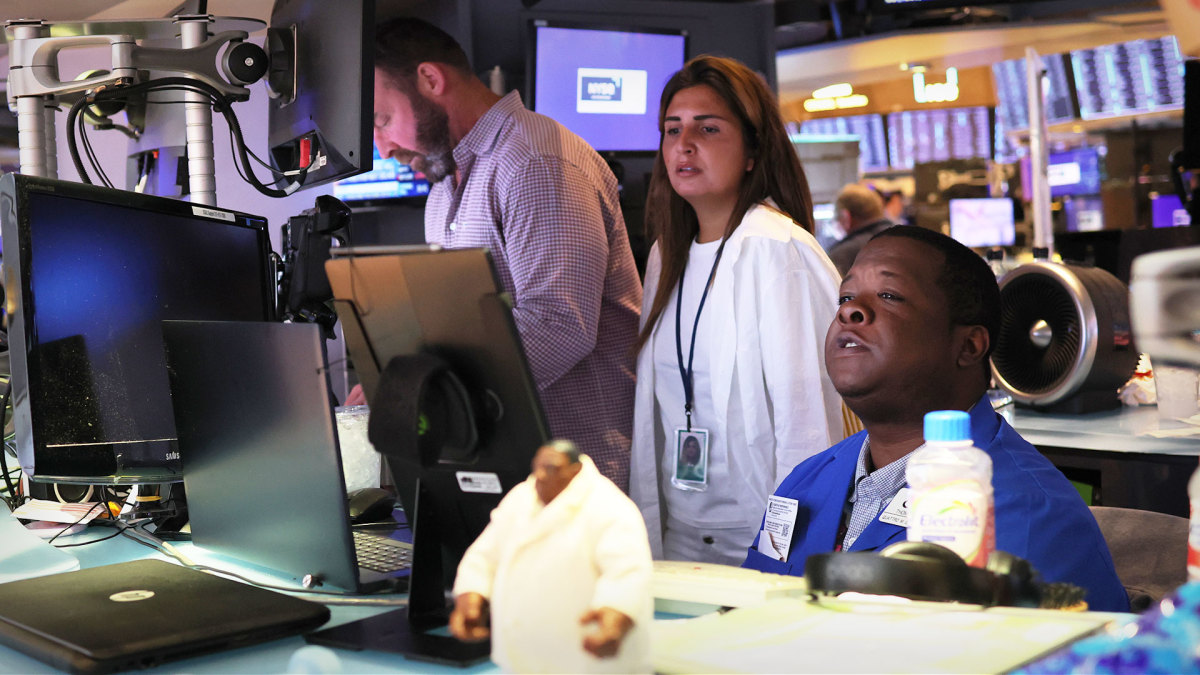
It's fair to say there was surprise, nay, disappointment that the great 2023 end-of-year rally ended, well, at the end of 2023.
The major averages all fell in the first week of January, with big technology stocks absorbing some of the biggest declines after investors were cheered by a huge nine-week rally and hoped for continued gains ahead.
The declines began to emerge on Dec. 29, after the Standard & Poor's 500 Index (^IN) -) came close to -- but failed -- to set a new all-time high. At the time, most of the major averages had been signalling the market was overbought.
Maybe the gains will start up again. One mediocre week does not make a year bad. The real hand-wringing will come if the market hasn't rebounded by the end of the month.
That's because January's performance is often a signal of how the markets will perform. It's been accurate 70% of the time since 1929. So, a good January may mean a good year for stocks.
January 2023 saw the S&P 500 rise 4.5%. The index ended the year up 22.4%. For the record, the S&P 500 fell 1.5% on the week. The Dow Jones industrials (^DJI) -) slipped 0.6%, and the Nasdaq Composite Index (^COMPX) -) dropped 3.3%.
Which brings us to two stocks to watch this week: Apple (AAPL) -) and Boeing (BA) -).
Apple jumped 48% in 2023. The tech giant is still the most valuable company in the world. This week, thanks to two downgrades on worries about whether revenue growth in its first fiscal quarter and beyond will be modest at best, the shares fell 5.9%.
Related: Top analysts deliver a blunt warning about Apple's stock
Boeing, up 36.8% in 2023 thanks to a resumption of travel and new orders, fell 4.5% this past week.
And we don't know what will happen to Boeing shares in the week ahead after a fuselage blowout on a Boeing 737 9 Max after a takeoff from Portland, Ore.
The Federal Aviation Administration ordered 171 737 Max planes operating in the United States grounded pending safety inspections. These take four to eight hours to complete, the FAA said Saturday (Jan. 6).
Other sources of unease
Interest rates rose a bit last week. The 10-year Treasury yield finished Friday at 4.046% on Jan 5, the first close above 4% since Dec. 13. It is still off from the intraday of 5.022% on Oct. 23.
Crude oil rose 3% to $73.81 barrel. Luckily, however, the national average price of gasoline, however, fell slightly to $3.079 a gallon by Sunday, the American Automobile Association reported. The price is down 20.7% since Sept 18 and has fallen on 117 of the last 122 days.
Continuing reports of corporate stress. Xerox Holdings (XRX) -) is planning to cut its global workforce by 15%. Struggling drug store giant Walgreen Boots Alliance (WBA) -) cut its dividend by 28%. Tesla (TSLA) -) fell 4.4% on the week to $247.49 in part because of news it is no longer the best-selling electric vehicle maker. It now appears China's BYD is tops. And food processing giant ConAgra Brands (CAG) -) said 2024 sales were likely to fall 1%-to-2%. It had been projecting a 1% gain. The shares, little changed on the week at $28.21 on Friday, fell 27% in 2023. Radio company Audacy (AUD) -) filed for Chapter 11 bankruptcy protection on Sunday, citing an uncertain economy and falling ad revenue.

Getty Images/TS
A decent jobs report
Friday's jobs report did offer some good news. The first estimate suggested payrolls expanded by about 216,000 in December, more than November's 173,000 and better than expected.
The unemployment rate held at 3.7%.
The numbers are probably not that robust but will still be good in the next two revisions.
Will the SEC approve a crypto ETF?
The big event this week will probably come Jan. 10, when the Securities and Exchange Commission is supposed to decide whether to approve the idea of exchange-traded funds that invest in cryptocurrencies.
A dozen or more asset managers want approval, including BlackRock (BLK) -) and Fidelity Investments, to market ETFs.
The first crypto ETF is likely to be based on bitcoin (~BTCUSD) -), the most widely held cryptocurrency. Bitcoin rose 3.5% this week to $44,000. It closed at $45,055 on Jan. 2, the first close above $45,000 since April 5, 2022.
But any investor in a crypto ETF must remember: It's a volatile group. Bitcoin was up 156.8% in 2023 after falling nearly 75% in 2022.
Also ahead this week:
Economic reports. The big reports are the Consumer Price Index report and the weekly Jobless Claims report, both due on Thursday.
Jan. 12 has the Producer Price Index Report.
The price indexes may help the Federal Reserve decide when to start cutting interest rates. Futures trading suggests traders see six rate cuts this year, starting with a cut in March from the current 5.25% to 5.5%. Many Fed watchers are skeptical. Other interest rates have been falling since October.
Fourth earnings season shifts into high gear. Conagra and others have already reported and others have warned about weak results. After three relatively quiet days, the reporting starts to get fast and furious with Taiwan Semiconductor (TSM) -), Infosys (INFY) -) and regional bank company WaFd (WAFD) -).
The financial giants come in. Friday, Jan 12 is their day to shine. They include health insurance giant UnitedHealth Group , JPMorgan Chase (JPM) -), BlackRock, Citigroup, Bank of America, Wells Fargo, and Bank of New York Mellon.
Delta Air Lines (DAL) -), the second-largest U.S.-based airline, also reports on Friday.







